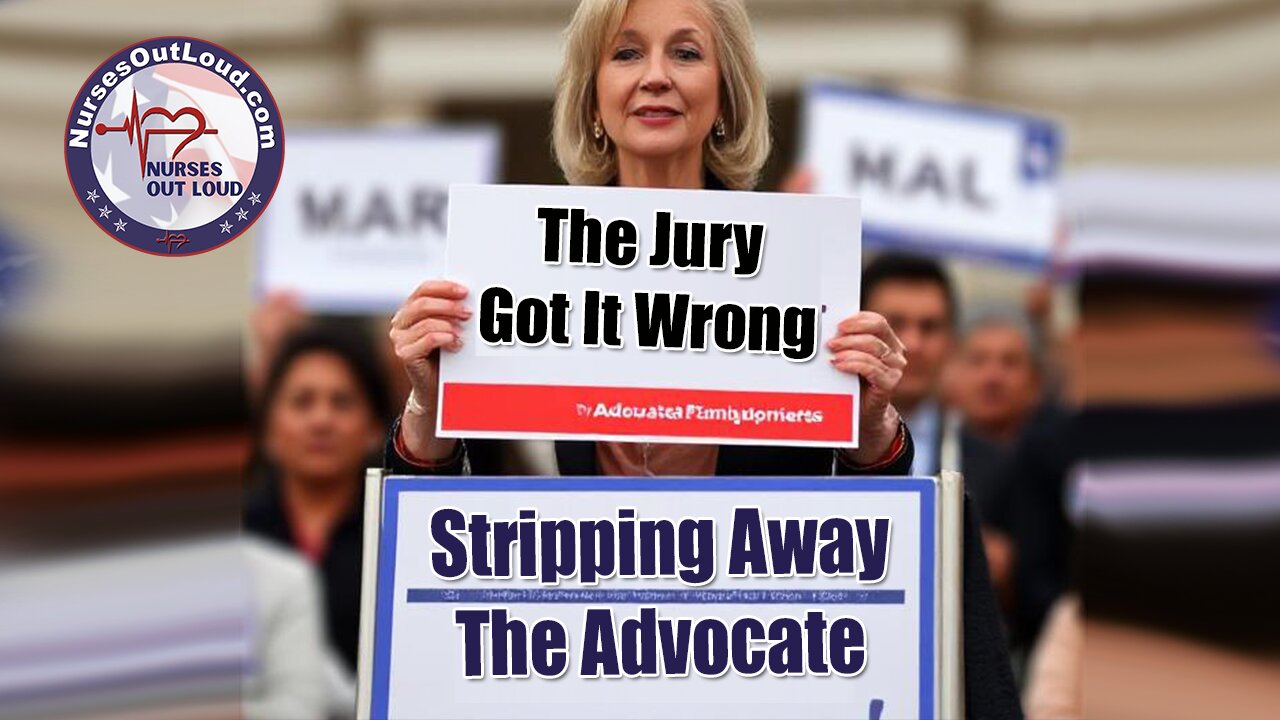Premium Only Content

The Jury Got it Wrong: Stripping Away The Advocate
Nurses are not only caregivers — we are patient advocates. This role is more than a professional duty; it is a moral imperative grounded in our Code of Ethics. When a hospital disregards this core function, patient safety, trust, and outcomes are placed at risk.
In Part 3 of this series, we examine five more ethical breaches that occurred in Grace’s case — breaches that collectively dismantled her last line of protection. The tragedy is compounded by the fact that her advocate, her father, was not a disruptive outsider but an integral partner in her care. Yet instead of valuing his insight, the healthcare team treated him as a nuisance and ultimately removed him without due process or a replacement plan.
Breach 5: Warnings Dismissed
Grace’s father repeatedly voiced concerns about her condition and the course of treatment. His observations were not emotional overreactions — they were grounded in intimate knowledge of his daughter’s baseline health and subtle changes in her behavior. Provision 3 of the Nursing Code of Ethics demands that nurses advocate for the patient’s rights, safety, and well-being. Ignoring such firsthand insight violates not only ethical principles but also the spirit of patient-centered care.
Breach 6: Escorted Out Instead of Invited In
Instead of initiating an interdisciplinary team (IDT) meeting to address concerns, the hospital had security escort Grace’s father out. This act is antithetical to Provision 2, which underscores the nurse’s duty to maintain a relationship of trust and partnership with the patient and family. Removing an advocate without discussion severs that trust and leaves the patient without their chosen representative.
Breach 7: No Replacement Advocate Appointed
When the primary advocate is removed, the ethical obligation does not end there. Provision 4 speaks to the nurse’s accountability in ensuring continuity of advocacy. By failing to appoint a replacement or verify that Grace still had someone safeguarding her interests, the team abandoned this responsibility entirely.
Breach 8: Failure to Create a Safe and Just Environment
Provision 6 calls for nurses to create and sustain safe, equitable, and supportive care environments. By eliminating the advocate and failing to fill the gap, the hospital created an unsafe setting — one where critical information and patient preferences could be overlooked or disregarded.
Breach 9: Erosion of Collaboration for Public Health and Social Justice
Provision 8 emphasizes collaboration to protect human rights and reduce health disparities. The deliberate exclusion of a family advocate undermines this collaboration, stripping the patient of a voice in decisions that directly impacted her life.
Grace died without her advocate by her side. This was not an unavoidable outcome of illness — it was the product of decisions that devalued advocacy, ignored ethical obligations, and prioritized control over collaboration.
The role of the nurse is clear: We are the patient’s last defense when systems fail. Our duty is to amplify the patient’s voice, protect their rights, and ensure their chosen advocates are respected participants in care. When that duty is abandoned, the consequences are irreversible — as they were for Grace.
The jury may have reached its verdict, but for nurses, the case is far from closed. We must hold ourselves — and our institutions — accountable so that no patient dies alone because their advocate was seen as an obstacle instead of an ally.
Watch Part 1
https://rumble.com/v6wi23c-jury-got-it-wrong-when-nurses-fail-the-family-too.html
Part 2
https://rumble.com/v6x5a5o-the-jury-got-it-wrong-sedation-without-consent-and-silencing-the-family.html
Never miss a show! Subscribe at https://substack.com/@nursesoutloud
https://nursesoutloud.com/
Find out more about ethics at https://righteousRn.com
-

Badlands Media
23 hours agoDevolution Power Hour Ep. 409
106K24 -
 1:52:38
1:52:38
Man in America
8 hours agoCommunists VS Zionists & the Collapse of the American Empire w/ Michael Yon
46.6K11 -
 LIVE
LIVE
Akademiks
2 hours agoSheck Wes exposes Fake Industry. Future Not supportin his mans? D4VD had help w disposing his ex?
1,546 watching -

SpartakusLIVE
6 hours agoTeam BUNGULATORS || From HUGE WZ DUBS to TOXIC ARC BETRAYALS
97.6K2 -
 LIVE
LIVE
BlackDiamondGunsandGear
2 hours agoAre You that guy? / Carrying a Pocket Pistol /After Hours Armory
365 watching -
 LIVE
LIVE
Camhigby
3 hours agoLIVE - Riot Watch Portland, DC, NC
203 watching -
 2:54:58
2:54:58
CAMELOT331
5 hours agoYouTube Just Told Me I OWE THOUSANDS $ TO THEM... update
20.2K2 -
 2:00:53
2:00:53
Tundra Tactical
12 hours ago $0.89 earned🛑LIVE AT 9PM CST!! Your Government Hates Your Guns : DOJ Holds Firm On National FIREARMS ACT
13.3K -
 LIVE
LIVE
DLDAfterDark
3 hours ago $1.16 earnedAre YOU The Guy That Ruins Thanksgiving?? - God Guns & Gear
313 watching -
 2:58:31
2:58:31
NewsTreason
4 hours agoDECLAS w/ Rambo & Dave: Nuremberg 2.0 | MTG Exits Stage Left | Mamdani Psyop Confirmed, 8pm EST
61.8K59